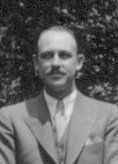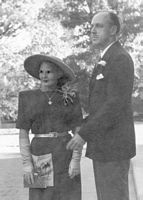|
| |
John N. or Norbert was born in Cincinnati on 8/5/1898. He married Margaret Grace Lester on 9/15/1921 in Cincinnati, Ohio.
Norbert and Margaret had 3 children: George in 1923, Peggy in 1925 and Jack in 1929.
In the 1920s and until 1935 they lived on Morrison Avenue in Clifton, Cincinnati, OH.. During the summers Margaret and the children stayed a cottage at Clark's Lake south of Jackson, MI. In 1935 the family bought a home at the corner of Brokline Avenue and Glenmary in Clifton. They also started to rent a cottage at Lake James (mear Angola) in northeast Indiana.
In 1946 They moved from Cincinnati and built a permanent home on Jammerson Lake in N.E. Indiana.
Margaret died in 1984Norbert died in August 1985.
"Dad, John Norbert Berger, was born in 1898 in Cincinnati, Ohio, was of Catholic German ancestry and part of a large loving family. He was a graduate of Xavier University. For three generations, my dad, his father and grandfather had been in the wholesale cigar leaf tobacco business under the name of the John Berger & Son Company (my grandfather was the “Son”). My great grandfather, John Berger, had come to Cincinnati from Alsace Lorraine in the 1850s. His son George, my grandfather, married the daughter of his father’s friend who had settled in Peoria, Illinois, and established the well known Trefzger’s Bakery at the site of what is now the Pere Marquette Hotel in Downtown Peoria."*
"Dad, with two of his brothers, Carl and Richard, followed their father in the cigar leaf tobacco business. The brothers expanded the business to include the buying and warehousing of Pennsylvania cigar tobacco near Lancaster, Pennsylvania, and Ohio cigar tobacco near Germantown, Ohio; growing and warehousing of Connecticut broadleaf cigar tobacco (a thimble full of tobacco seed would plant one acre) at a three hundred acre plantation near South Windsor, Connecticut (replete with housing for the Jamaican seasonal workers); and two cigar factories, one in Frankfort, Indiana, and the other in Wheeling, West Virginia. The original John Berger & Son Company is now The National Cigar Company. The cigar factory in Frankfort, Indiana, was and is the home of such memorable cigar brands as Lincoln Highway (From Coast to Coast), The Hoosier Poet (with picture of James Whitcomb Riley on the box lid), The Bankable (You can Bank on Bankable), El Verso, and R.G. Dunn. Also made at the Frankfort factory is the La Fendrich cigar. This brand, now owned by National, was originally owned by John H. Fendrich who had a large cigar factory in Evansville, Indiana, in the early 1900’s. The factory was the largest cigar factory in the world and the largest employer of women. The cigars were all hand rolled and produced at the rate of 350,000 a day."*
"John Norbert, the oldest child started working in the Tobacco business and bought and sold tobacco. He traveled a lot and would often see auctons of antiques. As he became older his antique interest overshadowed tobacco. He had some fabulous antiques but his personallity was not cut out for tobacco sales." by Fred Berger
"Mom, Margaret Lester Berger, was born in 1900 in Cincinnati. She was proud of her English ancestry-her mother, Grace Lester, was a descendant of Roger Williams of Rhode Island fame, and her father, Charles E. Lester, was a descendant of the Duke of Leicester."*
"Mom attended a Catholic college in Tuscaloosa, Alabama, but did not graduate. She became engaged to dad while at school and, according to the good sisters, spent too much time shining and admiring her large diamond engagement ring rather than pursuing her studies."*
"Mom had a twinkle in her eye and always enjoyed a good joke. One of her favorites went something like this. The young priest was nervously giving his first sermon under the watchful eye of the elder pastor. After the sermon the young priest went to his mentor for his comments. The elder priest complimented the young priest for his wonderful sermon and stated that he had made only three small mistakes. First, Daniel did not get into the lion’s den. Secondly, Jonah did not swallow the wale. Thirdly, there is not going to be a peter pulling contest at St. Taffy’s next Wednesday."*
"Mom had two brothers and a sister. Her younger brother, Lester Lester, was a Rhode’s scholar and studied philosophy at Oxford University. He later had a near nervous breakdown and spent the rest of his life doing landscaping. Mom’s sister married Stanley Bateman who started the first men’s store in downtown Cincinnati. His trademark was to greet every prospective customer near the front door. I wonder if Sam Walton purloined his Wal-Mart greeter idea from Uncle Stan. There is a difference though-uncle Stan always wore a dark suit and tie with a white carnation in his lapel."*
"I do not know when or how mom and dad met. I do remember mom telling me a charming story. As she related to me, she and a girl friend were taking a walk in the girlfriend’s neighborhood one summer evening. Mom stopped in front of a large Victorian house at 218 Hosea Avenue. She had an overpowering awareness of the future. She told her friend, “Someday, I am going to marry a man who lives in this house.” She was sixteen. Five years later she did indeed marry a man who lived in that house, my father."*
"Mom related to me a story that showed dad’s devotion to her. Once when mom was returning on the train to Cincinnati from Tuscaloosa, dad met her at the train carrying a large pistol. He mistakenly thought that a gentleman friend was accompanying mom on the train. Dad obviously did not cotton to “gentlemen friends” for mom."*
"This vignette does not surprise me. Dad even as a youth appeared at times to be a bit impetuous. Dad had told me that when he was young, he and his buddies liked to play war. They had fashioned long wood swords and rifles that fired huge rubber bands. They planned to attack a rival group on the next street. When the appointed time for attack arrived, one member of dad’s army did not show up. The absent soldier was immediately court marshaled and sentenced to hanging for desertion. The absent soldier was promptly found playing in his back yard. A rope was found and the hanging commenced. Dad told me that they were not actually going to hang him, just hoist him up a little. The horrified mother of the hangee, peering out her back kitchen window, thought that her son was about to meet his maker and promptly halted the military exercises."*
* quotes by Jack Berger
|



